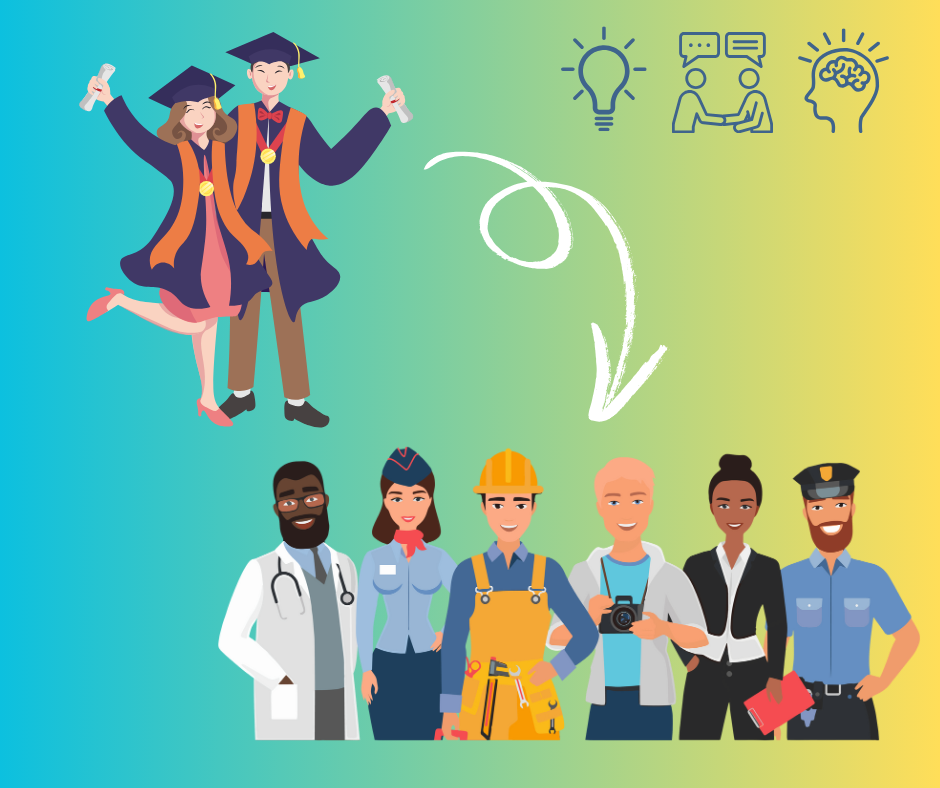From the first year in kindergarten, students learn concepts and skills to prepare for their future. School districts aim to teach employability skills so that their student body can grow into capable young adults. However, there has been a decline in the number of graduates ready for entry-level employment.
21st century skills include behaviors like critical thinking, communication, media literacy, initiative, productivity and leadership. With these skills, individuals can work with others to thrive in the workplace environment. Embracing these professional qualities is essential to an array of careers. It is a testament to an individual’s job performance as the modern market is very competitive.
School administration aims to provide optimal opportunities for their district so that their students can reach further success. “At the beginning of this school year, the high school staff collaborated to create school expectations based on the Universal Constructs, which are competencies and habits of mind needed for future successes in careers, post-secondary education and citizenry,” instructional coach Brian Gartner stated.
Classes like Personal Finance, Computer Science or Public Speaking assist in providing students with experiences to enhance those life skills. “In addition to that, the CTE department has taken professional development time to unwrap, plan and implement 21st century skills in their classrooms,” Gartner said.
Despite the rigorous planning to implement employability skill lessons in modern curriculum, there has been a serious decline in students ready for adulthood.
Contributing factors to this decline include depleted communication skills, incorrect grammar from casual language, dependence on others to execute tasks and less motivation to actively engage in education.
Instead of explicitly learning 21st century skills in the classroom, some students develop these behaviors independently. “I feel like most students learn time management and communication on their own by figuring out how to balance school and personal life, get homework done in time and find their own study tools,” senior Katelyn Chen expressed.
Chen feels there is a disconnect between modern education and stepping into adulthood. “I don’t remember any class that outright taught me how to manage my time,” Chen added. “I just figured it out through learning from my mistakes.”
The solution to this issue is a work in progress.
Some schools have taken initiative to account for employability skills within the curriculum. School districts like North Scott have found a way to record positive behaviors along with the traditional academic grading system. “The Lancer Way” is in accordance with the 21st Century Employability Skills adapted from the Iowa Core. Students are expected to be physically present, mentally present, respectful and excellent. This puts the significance of 21st century skills at the forefront of education.
If more schools included employability skills in class grades and implemented similar systems, students would be more likely to evaluate their daily behavior and work towards personal success following graduation.
Improving relationships between staff and students is also crucial to the functionality of understanding a collaborative, working and productive atmosphere. Academic engagement, personal motivation and social skills can flourish as a result. “Just simply treating us like young adults can help us stay disciplined and feel prepared for the future,” Chen stated.
Personal Finance teacher Rita Brown emphasizes the importance of employability skills in her classroom and has noticed the evolution of students in her business classes. “Employability skills must be developed like any other skill. Students must put it into practice on a daily basis,” said Brown. “I am extremely impressed with the progression made by students over a semester once they put in the effort, similar to lifting weights or studying for exams.”
Many high school students experience low self-esteem from surrounding pressures, so it can be difficult for students to feel sure of themselves and feel prepared to step into adulthood. “Employability skills are directly tied to confidence and being proud of oneself,” Brown noted.
Prioritizing 21st century skills in the classroom helps students adapt traits to become better decision-makers, problem-solvers, creative innovators and critical thinkers for the future.









